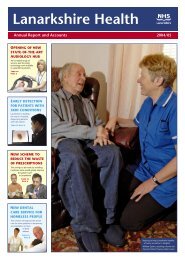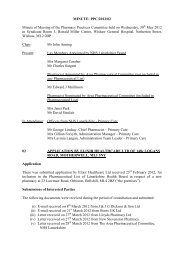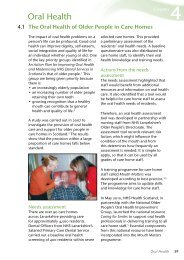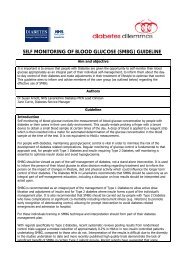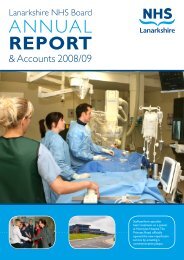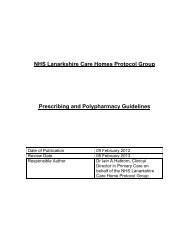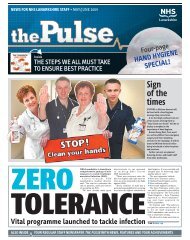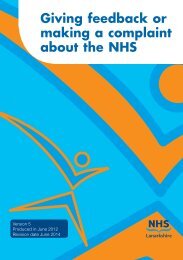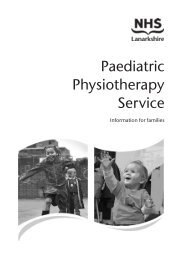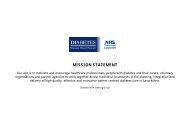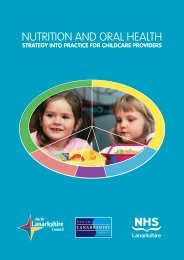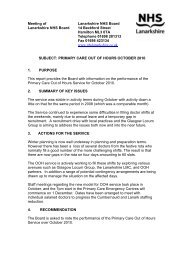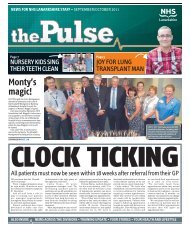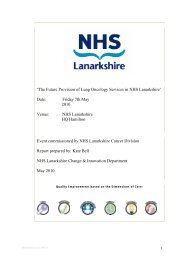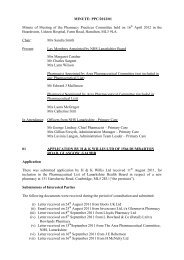Palliative Care Guidelines - NHS Lanarkshire
Palliative Care Guidelines - NHS Lanarkshire
Palliative Care Guidelines - NHS Lanarkshire
- No tags were found...
You also want an ePaper? Increase the reach of your titles
YUMPU automatically turns print PDFs into web optimized ePapers that Google loves.
<strong>Palliative</strong> <strong>Care</strong> <strong>Guidelines</strong>: Mouth <strong>Care</strong>Mouth <strong>Care</strong> in <strong>Palliative</strong> <strong>Care</strong>IntroductionMouth care is a frequently neglected but crucial aspect of palliative care. It maintains self-esteem,and the person’s ability to communicate and enjoy food and drinks.Assessment• Identify patients at risk of oral problems and plan regular mouthcare:e.g. receiving chemotherapy/radiotherapy, elderly, terminally ill, immunocompromised,nasogastric or PEG tube fed, O 2therapy, dysphagia, oro-pharyngeal disease.• Drug history:Anticholinergics (e.g. cyclizine, hyoscine, tricyclics) – increase dry mouth.Bisphosphonates – risk of osteonecrosis of the jaw particularly if teeth/gums are in poor condition.• Examine thoroughly using a torch and tongue depressor. Remove dentures and ensureprivacy. Avoid pain by lubricating cracked lips. Look for signs of dryness, coating, ulceration,infection or tooth decay. Assess for pain.• Document findings accurately and assess daily or at each visit.ManagementHealthy mouth• Keep mouth and lips clean, moist and intact; remove plaque and debris.• Prevent oral infection, tooth decay and halitosis.• Maintain fluid intake with frequent, small drinks.• Oral care using a soft, small-headed toothbrush, fluoride toothpaste and water after each mealand at bedtime.• Gauze on a gloved finger, soaked in water or chlorhexidine 0.2% may be used if the patient isunconscious or unable to tolerate a toothbrush.• Apply oral gel to dry lips after oral care.• Dentures should be cleaned and soaked overnight in a cleanser.Mouthcare if receiving chemotherapy/radiotherapy – key differences:• Chlorhexidine is not effective and may be harmful.• Use bicarbonate mouthwash (5ml spoonful dissolved in 1 pint of warm water) 4-6 times daily tokeep the mouth clean.• Avoid antipyretic analgesics (paracetamol, aspirin) if the patient is at risk of neutropenia; canmask fever due to sepsis.Painful mouth• Assess cause and treat accordingly.• Treat painful mucositis with benzydamine hydrochloride 0.15% (Difflam) 15ml, 2-3 hourly for upto 7 days. Dilute 1:1 with water if it stings too much.• Consider sucralfate suspension.• Analgesia: soluble paracetamol and/or aspirin gargle. Co-codamol (30/500) or morphine – ifmore severe pain. (see: Pain management)• Look for herpes simplex infection and treat appropriately.Dry/ coated mouth• Frequent oral care, maintain hydration, review medication.• Use a moistened soft toothbrush to remove coating.• Chlorhexidine gluconate 0.2% mouthwash, 10ml used twice daily. Dilute 1:1 with water if itstings. Inhibits plaque formation.• Cold, unsweetened drinks taken frequently through the day.• Saliva substitutes or oral gel if other measures insufficient.© <strong>NHS</strong> Lothian Issue date: January 2009 Review date: March 20121



